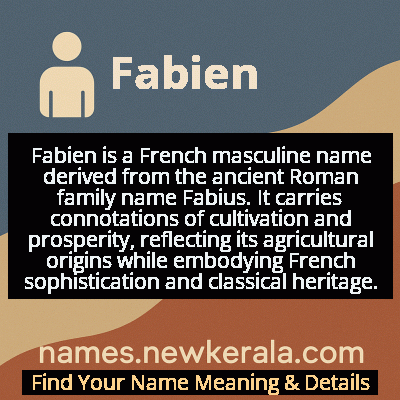Fabien Name Meaning & Details
Origin, Popularity, Numerology Analysis & Name Meaning of Fabien
Discover the origin, meaning, and cultural significance of the name FABIEN. Delve into its historical roots and explore the lasting impact it has had on communities and traditions.
Name
Fabien
Gender
Male
Origin
French
Lucky Number
1
Meaning of the Name - Fabien
Fabien is a French masculine name derived from the ancient Roman family name Fabius. It carries connotations of cultivation and prosperity, reflecting its agricultural origins while embodying French sophistication and classical heritage.
Fabien - Complete Numerology Analysis
Your Numerology Number
Based on Pythagorean Numerology System
Ruling Planet
Sun
Positive Nature
Leaders, ambitious, highly driven, self-reliant, innovative.
Negative Traits
Overly aggressive, domineering, impatient, selfish.
Lucky Colours
Red, orange, gold.
Lucky Days
Sunday.
Lucky Stones
Ruby, garnet.
Harmony Numbers
2, 3, 9.
Best Suited Professions
Entrepreneurs, managers, engineers.
What People Like About You
Courage, determination, leadership.
Famous People Named Fabien
Fabien Barthez
Professional Footballer
Goalkeeper for French national team that won 1998 FIFA World Cup and UEFA Euro 2000
Fabien Galthié
Rugby Player and Coach
Former French rugby captain and current head coach of French national rugby team
Fabien Cousteau
Oceanographic Explorer
Grandson of Jacques Cousteau, continued family legacy of marine conservation and documentary filmmaking
Fabien Frankel
Actor
British actor known for role as Ser Criston Cole in HBO's House of the Dragon
Name Variations & International Equivalents
Click on blue names to explore their detailed meanings. Gray names with will be available soon.
Cultural & Historical Significance
The name gained additional cultural resonance through various French artists, athletes, and public figures who bore the name, cementing its status as distinctly French while maintaining its classical roots. Throughout French-speaking regions, Fabien is often associated with intelligence, refinement, and a certain je ne sais quoi that embodies French cultural ideals of elegance and intellectualism. The name's usage in France reflects the country's deep appreciation for classical education and historical continuity, while its international recognition speaks to France's cultural influence globally.
Extended Personality Analysis
Individuals named Fabien are often perceived as sophisticated, intelligent, and charismatic. They typically possess a natural elegance and refined taste that draws others to them. Fabiens are known for their analytical minds and ability to approach problems with logical precision, likely influenced by the name's association with the methodical Roman general Fabius Maximus, famous for his strategic 'Fabian strategy' of attrition warfare. This translates to modern personality traits of patience, careful planning, and persistence in pursuing goals.
Many Fabiens exhibit strong communication skills and cultural awareness, often being well-read and knowledgeable about arts, history, or philosophy. They tend to be loyal friends and reliable partners, though they can sometimes appear reserved or overly cautious when first meeting new people. Their combination of intellectual depth and social grace makes them effective leaders who can inspire confidence while maintaining approachability. The name suggests someone who values quality over quantity in relationships and pursuits, preferring meaningful connections and well-considered actions to impulsive decisions.
Modern Usage & Popularity
In contemporary times, Fabien remains a popular masculine name primarily in French-speaking countries, particularly France, Belgium, Switzerland, and Quebec. The name experienced peak popularity in France during the 1970s and 1980s but has since maintained steady usage without being overly common. Modern parents choosing Fabien often appreciate its classical roots combined with its distinctly French sound. The name appeals to those seeking a traditional yet sophisticated option that stands apart from more trendy names. In recent years, there's been a slight resurgence of interest in classical names like Fabien as parents look for names with historical depth and international appeal. The name continues to be associated with education and refinement, often chosen by families valuing cultural heritage and intellectual tradition, while its relative rarity compared to more common French names gives it an exclusive quality.
Symbolic & Spiritual Meanings
Symbolically, Fabien represents growth, patience, and strategic thinking. The original meaning related to bean cultivation symbolizes fertility, sustenance, and the cycle of growth—planting seeds that develop into nourishing resources over time. This connects to broader metaphorical meanings of nurturing potential and long-term planning. The name also carries symbolism of endurance and tactical wisdom, inspired by Fabius Maximus's military strategies that emphasized persistence over immediate confrontation. In a modern context, Fabien symbolizes the balance between tradition and progress, representing someone who respects heritage while moving forward thoughtfully. The name evokes images of cultivated elegance, intellectual depth, and the quiet confidence that comes from understanding one's place in a larger historical and cultural continuum, making it emblematic of sustainable success achieved through careful cultivation rather than rapid acquisition.

